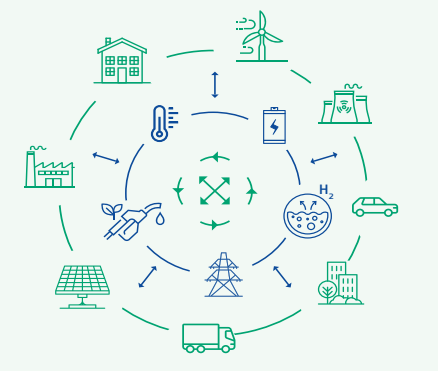
© iStock
Die Verringerung der Treibhausgasemissionen um 55 % und die Erreichung eines Anteils von 45 % erneuerbarer Energien im Jahr 2030 können nur dann erfolgen, wenn das Energiesystem dafür bereit ist. Um diese Ziele zu erreichen, muss Europa ein Energiesystem aufbauen, das viel intelligenter und interaktiver ist als heute.
Da der Stromverbrauch bis 2030 voraussichtlich um rund 60 % steigen wird, müssen die Stromnetze einen großen Teil der variablen erneuerbaren Energien integrieren. Die Wind- und Solarerzeugungskapazität muss von 400 GW im Jahr 2022 auf mindestens 1,000 GW bis 2030, einschließlich eines großen Aufbaus erneuerbarer Offshore-Anlagen bis zu 317 GW, an Land angeschlossen werden.
Daher müssen sich die Netze an ein dezentraleres, digitalisiertes und flexibleres Stromsystem anpassen, bei dem Millionen von Solarmodulen auf dem Dach und lokale Energiegemeinschaften Ressourcen teilen.
Investitionen in digitale Technologien wie IoT-Geräte und intelligente Zähler, 5G- und 6G-Konnektivität, einen europaweiten Energiedatenraum, der von Cloud-Edge-Computing-Servern betrieben wird, und digitale Zwillinge des Elektrizitätssystems sind entscheidend für die Beschleunigung der digitalen und nachhaltigen Energiewende und bringen gleichzeitig Vorteile für unseren Alltag.

Abbildung 1: Künftiges integriertes Energiesystem der EU: Energieflüsse zwischen Nutzern und Erzeugern, Verringerung der Ressourcen- und Geldverschwendung © Europäische Union; Quelle: EU-Strategie zur Integration des Energiesystems (europa.eu)
Im Energiesektor ist die Digitalisierung bereits im Gange, wie in vielen anderen Branchen. Elektrofahrzeuge, Solarmodule, Wärmepumpen und zahlreiche andere Geräte sind mit intelligenten Technologien ausgestattet, die Daten generieren und die Fernsteuerung ermöglichen. Die Zahl der aktiven IoT-Geräte in der Welt wird voraussichtlich rasch wachsen und im Jahr 2030 25,4 Milliarden übersteigen, während 51 % aller Haushalte und KMU in der EU über intelligente Stromzähler verfügen. Die Digital- und Energiepolitik der EU leitet koordiniert die Digitalisierung des europäischen Energiesystems, da Fragen wie Dateninteroperabilität, Versorgungssicherheit, Cybersicherheit, Privatsphäre und Verbraucherschutz nicht allein dem Markt überlassen werden können und eine angemessene Umsetzung unerlässlich ist.
Digitalisierung des Energiesystems – EU-Aktionsplan
Um diesen Wandel zu unterstützen, führt die Kommission eine Reihe von Maßnahmen durch Gesetzgebungsinitiativen, Investitionen und Koordinierung mit den Mitgliedstaaten durch.
Mittelfristig wird die Digitalisierung nahtlose Interaktionen zwischen verschiedenen Akteuren ermöglichen und es den Verbrauchern ermöglichen, von heimischen Energiequellen wie Solarmodulen und gemeinschaftseigenen Windenergieanlagen zu profitieren.
Zum Beispiel könnten die Verbraucher an Energiegemeinschaften und kollektiven Eigenverbrauchssystemen teilnehmen, indem sie ihre eigene Solarmodulerzeugung nutzen und von kostengünstigerem Strom profitieren als der Kauf aus dem Netz. Ebenso könnte die bidirektionale Aufladung von Elektrofahrzeugen während der Spitzenzeiten zusätzliche Energieressourcen bereitstellen.
Abbildung 2: DieGeneraldirektion Kommunikationsnetze, Inhalte und Technologie (GD CONNECT) unterstützt Maßnahmen zur Digitalisierung des Energiesystems. © Europäische Kommission
Langfristig wird die Digitalisierung eine Notwendigkeit sein, dezentrale Formen erneuerbarer Energiequellen in das Stromnetz zu integrieren und die Abhängigkeit von importierten fossilen Brennstoffen und deren Preisvolatilität zu verringern. Diese Integration erfordert mehr Aufmerksamkeit für das Netzmanagement und mehr Netzflexibilität auf lokaler Ebene, was durch die Aktivierung der Verbraucher und eine bessere Verwaltung der Energieressourcen der Prosumenten erreicht werden kann.
Ein nahtloser Zugang zu granularen Daten über den Zustand des Stromnetzes und der Prosumeranlagen wird für die Erbringung von Energiedienstleistungen von entscheidender Bedeutung sein, kann aber nur durch weit verbreitete digitale Tools und gemeinsame Dateninfrastruktur erreicht werden.
Eines der wichtigsten Ergebnisse des Aktionsplans ist die Entwicklung eines Gemeinsamen Europäischen Referenzrahmens (CERF) für energiesparende Anwendungen. 2023 markierte ein entscheidendes Jahr bei der Umsetzung dieser Maßnahme, wobei im März 2023 die Blaupause der ersten Generation für einen CERF für energiesparende Anwendungen im Rahmen des Projekts „Horizont 2020“ – unterstütztes InterConnect-Projekt – erfolgreich vorgelegt wurde.
Im Rahmen des DIGITAL-Programms wurden auch die Vorbereitungen für die Einführung des Bauplans der zweiten Generation des CERF für energiesparende Anwendungen eingeleitet. Weitere Einzelheiten zu dieser Arbeit finden Sie hier: Erfüllung unseres Versprechens zur Einführung eines gemeinsamen europäischen Referenzrahmens für energiesparende Anwendungen | Gestaltung der digitalen Zukunft Europas (europa.eu).
Neueste Nachrichten
Zugehöriger Inhalt
Gesamtbild
Digitale Industrieplattformen sind der Schlüssel, um Europa bei der digitalen Transformation voranzubringen und Technologiebausteine und industrielle Anwendungen miteinander zu verknüpfen.
Vertiefen
Die EU-Politik zur Förderung von Strategien für Daten, Cloud und Edge sowie Cybersicherheit ist für die Digitalisierung des Energiesystems von zentraler Bedeutung.
Die EU leitet den digitalen und grünen Wandel des Energiesektors durch Schlüsselinitiativen in den Bereichen Forschung, Innovation und grenzüberschreitende Infrastruktur, die für die digitale Integration unerlässlich sind.
Siehe auch
Die EU unterstützt den Verkehrssektor durch die Einführung neuer Technologien, um sauberer, sicherer und effektiver zu werden.
Die Kommission hat in den letzten Jahren zahlreiche groß angelegte Pilotprojekte eingerichtet, um die Digitalisierung der Industrie in ganz Europa und darüber hinaus voranzutreiben.
